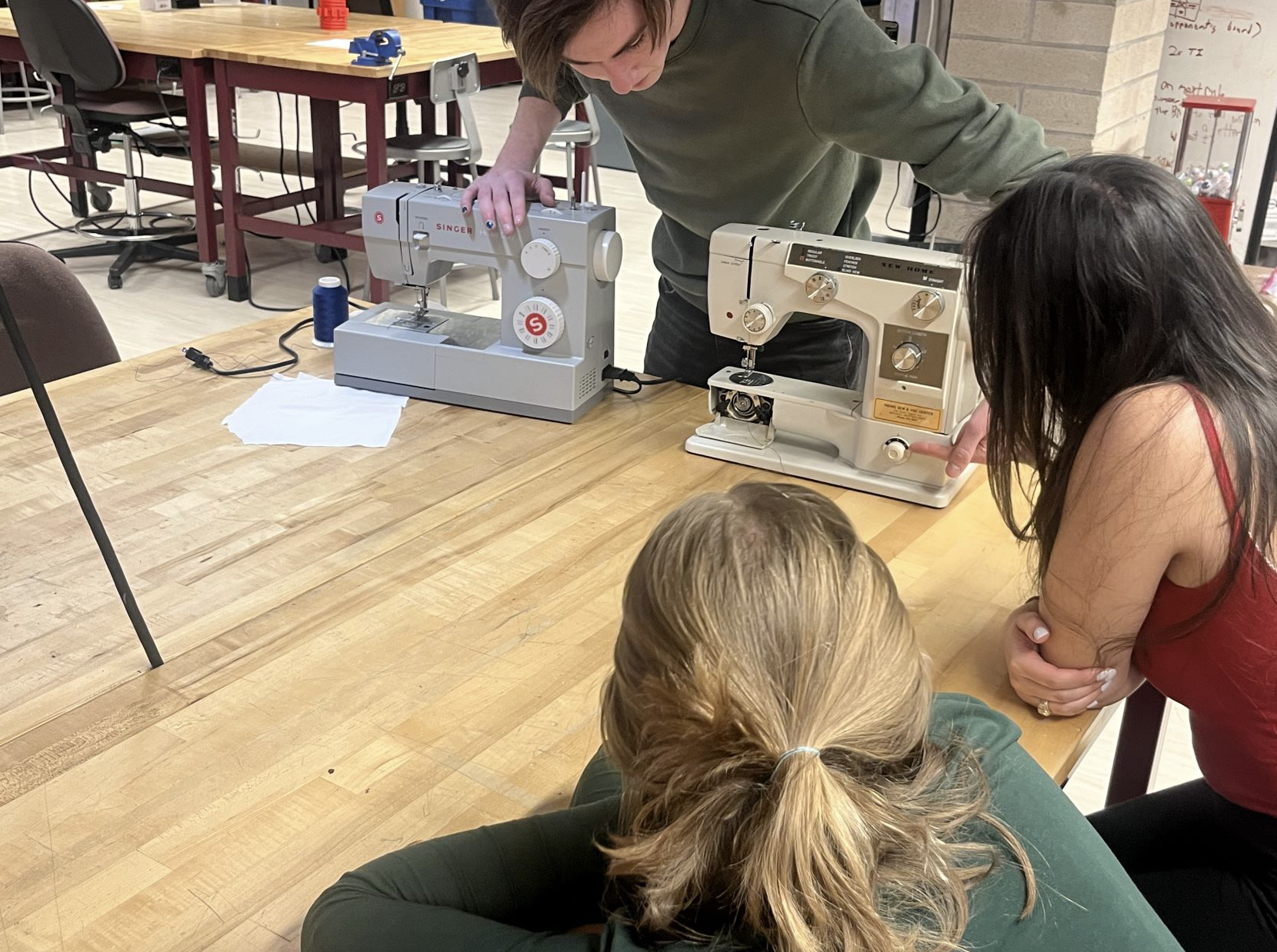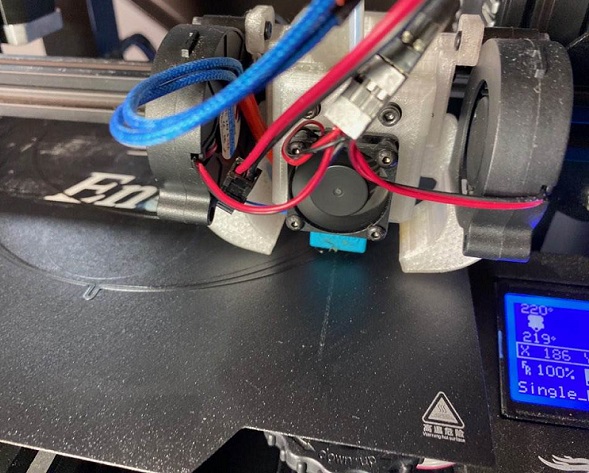The I in Innovation Labs Stands for Inclusivity
Innovation and creativity are the key components to virtually all technology and advancement, and down at DU’s Innovation Labs, that’s a concept they understand.
Micheal Caston, Executive Director of the Innovation Labs and Professor of Practice in Product Design and Development, was one of the architects of DU’s current Maker Space, and was a big proponent in pushing for its expansion. Originally only comprised of a few laser engravers and 3D printers, the Labs have expanded to include three separate makerspaces with different specializations: the Digital Lab, Woods Lab, and Plastics Shop.
“The Innovation Labs is open to all students, faculty and staff, and is free of charge. We provide a creative playground for innovative thoughts and creation, for coursework, for personal projects, or for new venture creation. Or for just coming in and fixing holes in your pants,” Director Caston explained.
After its expansion, Dmitri Obergfell stepped into the role of the Operations Manager of the Innovation Labs. In working closely with Director Caston, Obergfell has brought his art’s degree from Rocky Mountain College of Art and Design and his years of experience building art installations to the role.
“The relationship between myself being a visual artist and being involved in the main engineering program with DU is a unique relationship,” Manager Obergfell says. “And when I was hired, Michael showed that he thought that it would be a good energy to match with engineering.”
From gumball machine characters to cardboard furniture to murals, the Innovation Labs is a breeding ground for art, creativity, and new design. In addition, the Innovation Labs strives to be more than just open to new ideas, but also open-access to everyone in DU’s community.
Down in the Labs, anyone who walks in can be an innovator.
“[The Labs] provide a space for people with different ideologies, perspectives and disciplines to come together collectively and learn from one another,” Caston says.
“We try to create that open access and inclusive space, and you don’t have to necessarily take a workshop to gain access. Innovators come in there and student [facilitators] are there to help use whatever equipment is in there and find the resources and supplies you might need for whatever you’re working on.”
Student facilitators help prospective innovators source free materials for their projects through the Labs’ resource center, which is an important part of ensuring a low barrier to access for all. As one of the biggest employers of students on campus, student facilitators are integral to the Innovation Labs, responsible for almost every aspect of its function from HR and marketing to maintenance and operations. Manager Obergfell emphasized how student-driven the Labs try to be.
“My goal and my position is really just to set up the students to flourish,” Obergfell says. “That means encouraging the students to come up with a vision for the space and how they want it to operate, and encouraging them to come up with workshops that they want to see in this space.”
Obergfell highlighted a student-crafted workshop, called Femmes and Thems, that was started by seniors Rory Taylor and Ray Laciny. The workshop is targeted at bringing women and non-binary people into the Labs.
“Woods Shops are predominantly male-oriented… With Femmes and Thems, we’re trying to make a space where non-binary people and women can come in and learn to use the tools without worrying about any sort of judgment that might dissuade them from it. And then, hopefully they'll come back and use the space with their own knowledge and skill set and competence,” Obergfell says.
Director Caston added how rewarding it has been for him to work so hands-on with students.
“New things come up every day. And you’re able to give them creative license to explore those ideas and see what they come up with based on their passions,” Caston says.
The Labs are always busy with new ideas and projects that can range from contract work with third-parties to art installations that make use of the Labs’ equipment. Director Caston highlighted some of his favorite projects, past and current.
“Within the Innovation Labs, we have a business called the MicroFactory and we’ve completed 160 projects… One of the students created—they call it a brain jig—and it’s a fixture to hold the human brain, obviously a cadaver brain, so that it can be accurately sliced up,” Caston explains. The “brain jig” order was worth $50,000 and was set up by the student consultancy at the MicroFactory. “Last year, we had a project from the Denver Zoo. The Denver Zoo had 50 fruit bats and they thought they were all females, but there was a male in there. And all of a sudden they had 2000 fruit bats!”
The Denver Zoo was forced to quickly construct additional enclosures for the fruit bats, but after looking at guano samples, they determined that the bats weren’t happy in their current enclosures, so they contracted with the MicroFactory to improve the bats’ habitats.
“They asked us to build sets of stalactites that they could put in there and they could change the arrangement of them to try and improve their quality of life,” Caston explains. Altogether, it took parts from the Digital Lab, Woods Lab and Plastics Shop to create the stalactites for the fruit bats.
In addition to these larger projects, Director Caston highlighted a variety of other projects students are working on from murals to a student start-up called Icebox that will produce Super Smash Bros. game controllers with the laser engraving machines.
Student facilitators who work on the operations team in the Labs shared some of their favorite projects and experiences in the Labs.
“I’m the president of the Dungeons and Dragons club… I really enjoy and have for a long time building real sets. And so I use all three printers and stuff we've got to put together buildings… and we’ve got six or seven buildings that I painted up downstairs that I’ve got to finish working on,” says sophomore Brian McCulloch, one of the operations facilitators who helps students use the Digital Lab.
“I’m much more artistic with my 3D printing, but myself and Carter Trexler have been building Vorons, which are like an open source design 3D printer,” McCulloch adds. “You print the parts on one printer, then you can build a printer, and then use it to print the parts for more printers.”
The self-replicating design is what helps bring down the cost, making the machines more affordable than they’ve ever been before.
Another operations facilitator, sophomore Hector Rodriguez, highlighted another project made from a student’s ingenuity when he turned a sewing machine into an embroidery machine.
“So he only had a sewing machine, but he wanted to make it an embroidery machine. So he created another axes that would go along [horizontally] and up, down left and right, so that the sewing machine would just stay stationary, but the information fed through the computer would move the axes correspondingly to the embroidery machine,” Rodriguez says.
One big thing that everyone from the Innovation Labs emphasized was its availability to all DU students, staff, and faculty—free of charge.
“Please come, it’s free and there’s so many great resources,” says sophomore Megan Bridgeman, another operations facilitator. “And we want you to use them… If you just come in and you’re like, ‘Hey, I want to print something’, we'll show you right away. But if you want to learn in a group, then there’s workshops.”
Introductory workshops for the Woods Lab and Digital Lab are hosted multiple times a month, along with special events for fun creations like fidget spinners and cutting boards. Because of limited space, registration is first-come, first serve, but it is open to all on campus. For a full list of dates and descriptions of upcoming workshops and events, visit the Innovation Labs events page.
“If you have an idea, come on in. If you don’t have an idea, come on in anyway,” Director Caston says.
The Innovation Labs is always looking to expand and become more inclusive, and regardless of your role at the University of Denver, you can be a part of it, too.




